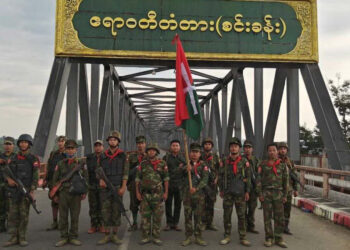NAYPYIDAW — Burma Army Chief Snr-Gen Min Aung Hlaing has called the demands of some ethnic armed groups “unrealistic” and described them as “far beyond the federal system.”
In his opening address to the second session of the 21st Century Panglong Peace Conference which convened in Naypyidaw on Wednesday, the army chief said he had studied the 72 papers submitted to the previous peace conference and that the discussions, presentations and fundamental concepts outlined by some ethnic armed groups had reached “far beyond” the right to autonomy promised in a federal system.
“Such acts go against the desires and interests of the people, who have high expectations [for] democracy and the peace process,” said the senior general.
Describing the Tatmadaw as “responsible for protecting the interest of the State and the people,” Snr-Gen Min Aung Hlaing said the military would take action against “any organization committing destructive acts.”
In order to achieve peace, the Burma Army chief said that the military would adhere to the nationwide ceasefire agreement (NCA) and its six-point peace policy based on responsibility, accountability and transparency.
It is this six-point position that has arguably caused a deadlock in peace negotiations in recent years, as the Tatmadaw and ethnic armed organizations have differing perspectives on the goal of how to build a federal state.
U Myo Win, the vice chairman of NCA signatory the All Burma Students’ Democratic Front (ABSDF), said he was “not worried” about the opinions expressed in the opening speeches of the peace conference.
“The Tatmadaw presented its position, which is a different perspective, but consistent. The key is that we accept these differences and find a way we can be able to reach a common understanding at the political dialogue.”
He added that the Tatmadaw, the government, and the ethnic armed organizations including the coalition the United Nationalities Federal Council and the northeastern armed groups, all have their own views on the mechanisms with which to build a future federal state.
Groups active in Burma’s north and led by the powerful United Wa State Army have promoted an alternative peace process not adherent to the NCA path. Yet its representatives did join Wednesday’s peace conference opening, and liaison officer Sam Lop told The Irrawaddy that they had come to the event in order to “show their collaboration to achieve peace.”
The senior general reiterated that he felt certain armed groups were ignoring the NCA policy, although it is agreed in the NCA that a democratic federal Union would be built in line with the outcome of political dialogue based on freedom, equality and justice.
“Ignoring this and pursuing the other, or second way, would be an attempt to loathe the establishment of a Union based on peace, democracy and federalism,” said the army chief, in the official translation of his speech, referring to the 15-point policy presented by the UWSA and adopted by members of the Northern Alliance of armed groups at the Panghsang Summit in April.
“We have to assume that the attempt is tantamount to grabbing power and splitting from the Union through armed struggle,” he added.
Political analyst U Kyaw Win said that the previous government—which laid the foundation for the NCA—and the new government—which continues to implement it—and the Tatmadaw—which has been cooperating with them—should be thanked for the current peace process.
“Currently, the NCA is only the way which is feasible for both peace and for amending the Constitution,” U Kyaw Win said.
U Than Htay, chairman of the Union Solidarity and Development Party, shared the army chief’s views.
He listed ethnic armed groups’ demands submitted to the first conference which he felt “went against unity.” These included suggestions to change the name of the country, to alternate in assuming the post of the Burma Army chief, to establish new states, and to be allowed the right to secede from the Union.
“We must cultivate the spirit of constantly protecting Our Three Main National Causes,” said Snr-Gen Min Aung Hlaing, referring to the rhetoric adopted under the military regime of State Peace and Development Council, which include the “non-disintegration of Union, non-disintegration of national solidarity and perpetuation of sovereignty.”
As it was decided in a recent meeting of the Union Peace Dialogue Joint Committee (UDPJC) that divisions and states would have the right to draft their own constitutions, the USDP chairman also stressed that those constitutions should conform to the 2008 Constitution.
“They should not contradict or overstep the 2008 [military-backed] Constitution. They should not go against the constitution of the Union,” U Than Htay said.
















